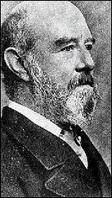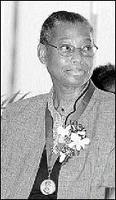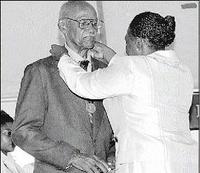Verene Shepherd, Contributor

Sir Anthony Musgrave
WHILE IN Jamaica, Musgrave also signalled his intention to improve the islands infrastructure and the management of its educational institutions; as well as establish a commission to investigate the civil service. He announced his intention to embark on a tour of the island so that he could make his own observations on the state of the island.
In the meantime, he continued to deal with matters relating to the Florence and Octavia; the audit system and laws of Jamaica; the civil service, postal union and health, water and meteorological concerns. He recommended the increase in the number of official and unofficial members of the Legislative Council and went about securing a second house at Flamstead in the cooler climes above Gordon Town.
Of the various issues claiming his attention, those of the cropping of womens hair and the new taxation imposed by Musgraves administration proved the most contentious internally. The report that Carnarvon had requested from Trinidad on the first matter arrived in 1878; and based on it, Carnar-von approved the punishment, which Musgrave put into effect used as a last resort and only for repeat offenders and for offences committed within the prison walls.
sugar planter class
But the reimposition of the poll tax on breeding stock predictably led to petitions to the Governor from the pen-keepers. His obvious financial support of the sugar planter class did not improve Musgraves standing amongst the non-sugar sector. On the other hand, time-expired Indians would not have been happy with his policy on their migration to third countries and his opposition to the presence of recruiting agents in the island to facilitate their migration.
Musgraves island tour was no doubt a highlight of his first two years and he considered it a success. After touring the various parishes and listening to petitions, and speeches by various individuals, he claimed that everywhere he went he observed loyalty to the Queen by all classes of the inhabitants, as well as personal respect for him as her representative. He also concluded that the author of the article in Frasers Magazine titled The West India Question, in which, among other things, the author had claimed that on every side in Jamaica) the evidence of ruin strikes the eye of the most careless observer in abandoned estates, in dilapidated buildings, in fields once cultivated now turned to waste, in neglected roads and crumbling bridges, was wrong. He hoped that his own post-tour report on Jamaica would refute the article. In Manchester and upper Clarendon, he reportedly saw a prosperous peasantry a reason, in his view, that people from those parishes had no wish to work on the sugar estates. He found the infrastructure in pretty good shape and argued that contrary to reports circulating in the United Kingdom (UK), the people were not indolent or dishonest.
civil service
By the end of 1878, the Commi-ssion charged with investigating and reviewing the civil service had submitted its report, somewhat too late as it turned out as by then Musgrave felt himself quite informed about Jamaica. In fact, he had had time to ascertain that much of what was circulating in the UK about the island was less than accurate.
Despite Musgraves optimistic view of his support, there was internal opposition, both to Musgrave as an individual and to the system of Crown Colony government (CCG) that he administered. The Colonial Standard and Jamaica Despatch of Monday 30 June 1879, carried an editorial which painted a picture of a despotic government under the CCG, a crabbed, heartless officialdom, over-taxing the population. These sentiments would grow as the new taxation policy was implemented and the damages in the case of the Florence paid.
Yet, Musgrave improved the social and physical infrastructure greatly during 1879. Under his watch, the Government acquired the railway from the Railway Corporation, thereby improving internal communication. He was a firm believer in tertiary education, the arts and science. He lamented the failed experiment of the Queens College in Spanish Town, and proposed to the British Government the introduction of a competitive Island Scholarship valued at £200 per annum for three years, for a suitable candidate to go to a university in Britain. Eventually the board of the Institute of Jamaica (IOJ) was invested with handling the arrangements after approval by the British Government.
The IOJ had been established in 1879 by his suggestion to the Legislative Council. He urged the Legislative Council to approve the establishment of a governing body for the management of a high school to promote higher education in the island and funds to facilitate an increase in the number of pupil teachers at Government training colleges, the construction of a line of electric telegraphs between Kingston and Montego Bay with a branch from St Anns Bay to Port Antonio, the subsidising of the West India and Panama Telegraph Co for the purpose of securing telegraphic communications with other countries; the extension of the railway to Porus and Ewarton; the restoration of Milk River Bath; and the extension of cinchona cultivation on the Government plantation in St Andrew. He also put into effect the system of registration of vital statistics, introduced a new marriage law that allowed civil marriages, appointed marriage officers, passed the divorce law, made changes to the judicial system and established steam communication around the island.
corporal punishment
Musgrave had to deal with the subject of punishment. The three main types of punishment handed down by courts were hanging, corporal punishment/public flogging and imprisonment (often with flogging). According to the attorney general, public flogging had been abolished in 1870 but reintroduced in 1877 for certain offences at the discretion of the judges.
Attracting this punishment were obeah, prison indiscipline and repeat conviction for praedial larceny. For praedial larceny the place of flogging was to be chosen by the Governor; but during Musgraves tenure, public flogging was outlawed and flogging was administered only within the prison walls. The law was also amended to allow flogging to apply to first-time offenders for praedial larceny instead of confined to second time offenders as previously.
prerogative
Musgrave never advocated the abolition of flogging and hanging (although he was at pains to assure the Colonial Office that hanging in Jamaica was not carried out by the long drop), although he did, from time to time, use his prerogative to order a stay of execution, commute hanging to life imprisonment or advocate for reduced lashes, time in prison and even pardon (and freeing) of some in prison for extended periods. For example, he attempted, though unsuccessfully, to reverse the sentences of the 11 remaining prisoners in the general penitentiary three women and eight men who were still serving sentences for their alleged roles in the Morant Bay Rebellion. All 11 had by then served 15 years and he believed there would be no harm in freeing them and sending them back to St Thomas where no revolutionary atmosphere existed.
Professor Verene Shepherd is president of the Association of Caribbean Historians.

Professor Mercedes Richards, gold medal awardee at the Institute of Jamaicas annual Musgrave Medals Award ceremony, held at the IOJ Complex, East Street, Kingston on Wednesday October 15. - photos by Winston Sill/Freelance Photographer

Olivia Grange (right), minister of information, culture, youth and sports, presents a gold medal to Carey Robinson, former chief executive officer of the Creative Production and Training Centre at the Institute of Jamaicas annual Musgrave Medals Award ceremony on Wednesday .

